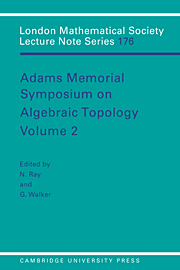Book contents
- Frontmatter
- Contents
- Preface
- Contents of Volume 1
- Programme of one-hour invited lectures
- Programme of contributed lectures
- Programme of Posters
- Participants in the Symposium
- Addresses of Contributors
- 1 Progress report on the telescope conjecture
- 2 On K*-local stable homotopy theory
- 3 Detruncating Morava K-theory
- 4 On the p-adic interpolation of stable homotopy groups
- 5 Some remarks on υ1 -periodic homotopy groups
- 6 The unstable Novikov spectral sequence for Sp(n), and the power series sinh−1(x)
- 7 Unstable Adams spectral sequence charts
- 8 On a certain localization of the stable homotopy of the space XΓ
- 9 Cooperations in elliptic homology
- 10 Completions of G-spectra at ideals of the Burnside ring
- 11 Theorems of Poisson, Euler and Bernouilli on the Adams spectral sequence
- 12 Algebras over the Steenrod algebra and finite H-spaces
- 13 The boundedness conjecture for the action of the Steenrod algebra on polynomials
- 14 Representations of the homology of BV and the Steenrod algebra I
- 15 Generic representation theory and Lannes' T-functor
- 16 Some chromatic phenomena in the homotopy of MSp
- 17 On a conjecture of Mahowald concerning bordism with singularities
- 18 Topological gravity and algebraic topology
11 - Theorems of Poisson, Euler and Bernouilli on the Adams spectral sequence
Published online by Cambridge University Press: 18 January 2010
- Frontmatter
- Contents
- Preface
- Contents of Volume 1
- Programme of one-hour invited lectures
- Programme of contributed lectures
- Programme of Posters
- Participants in the Symposium
- Addresses of Contributors
- 1 Progress report on the telescope conjecture
- 2 On K*-local stable homotopy theory
- 3 Detruncating Morava K-theory
- 4 On the p-adic interpolation of stable homotopy groups
- 5 Some remarks on υ1 -periodic homotopy groups
- 6 The unstable Novikov spectral sequence for Sp(n), and the power series sinh−1(x)
- 7 Unstable Adams spectral sequence charts
- 8 On a certain localization of the stable homotopy of the space XΓ
- 9 Cooperations in elliptic homology
- 10 Completions of G-spectra at ideals of the Burnside ring
- 11 Theorems of Poisson, Euler and Bernouilli on the Adams spectral sequence
- 12 Algebras over the Steenrod algebra and finite H-spaces
- 13 The boundedness conjecture for the action of the Steenrod algebra on polynomials
- 14 Representations of the homology of BV and the Steenrod algebra I
- 15 Generic representation theory and Lannes' T-functor
- 16 Some chromatic phenomena in the homotopy of MSp
- 17 On a conjecture of Mahowald concerning bordism with singularities
- 18 Topological gravity and algebraic topology
Summary
Introduction
Let Ext denote the E2 term of the classical Adams spectral sequence for the stable sphere mod 2 [Al]. Then Ext is a bi-graded algebra over the field of 2 elements. Write e(s, t) for the rank of this vector space in bi-grading (s, t).
It would be very helpful if we could find a method to compute these ranks, with sub stantially less work than it now requires to obtain Ext itself, or Ext with much of its algebra structure. Perhaps this is not a well-posed problem; we have certainly not “solved” it. What we do have to present at this time is some interesting observations about these numbers.
First, the numbers e(s, t) are not randomly distributed in the plane (or in any part of the plane). We call this “Poisson's theorem”.
Next, the alternating sums of the e(s, t) can easily be computed, in the form of a simple generating function. We call this “Euler's Theorem”.
If these alternating sums are defined in the right way, they are all O's and l's, and the gaps between the l's can be described in terms of the Bernoulli numbers. This gives us “Bernoulli's theorem”.
Topologists will already have noticed that our theorems are not really about the Adams spectral sequence, but rather about its E2 term.
Our title may seem facetious, but it signals to the reader that our results have a classical (and elementary) flavor, and that this note is meant to be enjoyed.
- Type
- Chapter
- Information
- Adams Memorial Symposium on Algebraic Topology , pp. 179 - 186Publisher: Cambridge University PressPrint publication year: 1992



